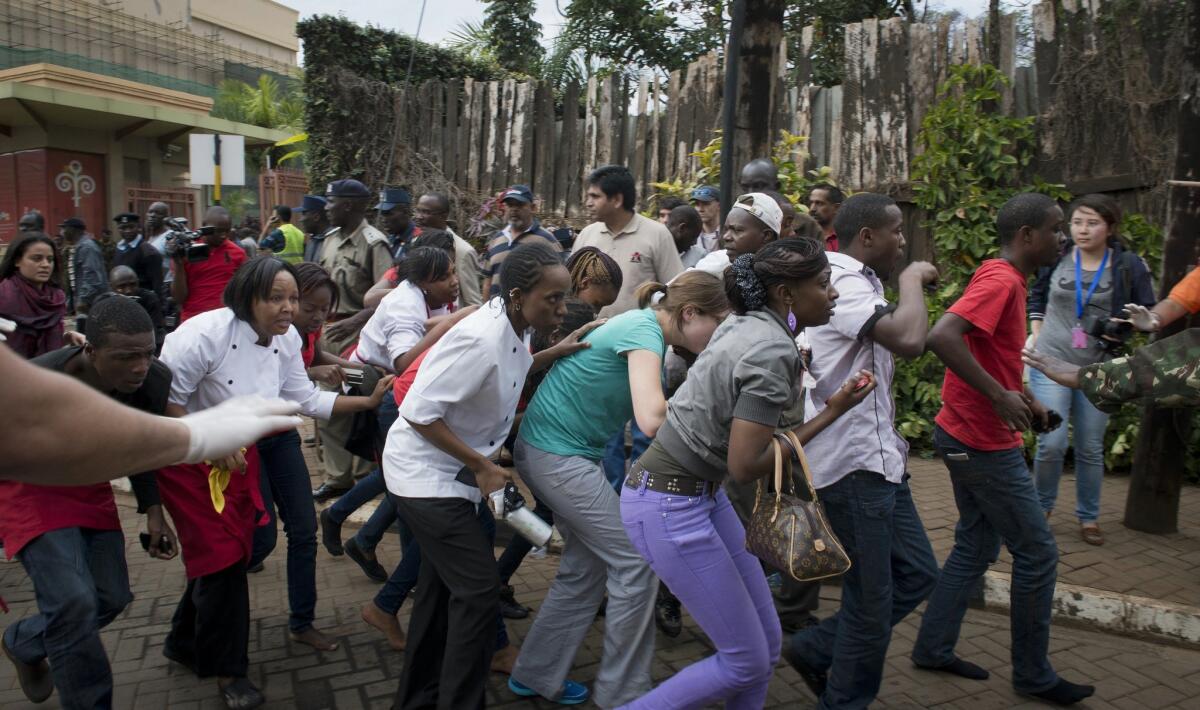U.S. drone strike believed to have killed Shabab commander in Somalia

- Share via
Reporting from Johannesburg, South Africa — The Somali extremist group Shabab faced a new setback after one of its top surviving commanders was reported killed in a U.S. drone strike.
Col. Steve Warren, a Pentagon spokesman, said Friday that the military had conducted a counter-terrorism operation in Somalia against an unnamed high-value member of the Al Qaeda-linked militant group that involved “no boots on the ground.”
A U.S. Defense official, who was not authorized to speak on the record, confirmed Friday that Shabab leader Adan Garar was the target of the attack and was believed to been killed, though results of Thursday’s strike are still being assessed.
However, Kenyan news media, citing intelligence officials, reported that the strike had killed Garar, a strategic commander who helped plan the Shabab’s high-profile attack on the Westgate shopping mall in Nairobi in 2013.
According to the reports, Garar was targeted while traveling in a car with two other men near the southwestern town of Bardera, in a region that borders Kenya. Garar was a member of the Shabab’s shura, the governing council of the group.
At least 67 people were killed when four Shabab gunmen attacked the Westgate mall, shooting shoppers, including children, and sparing only those who could prove they were Muslims. The gunmen who carried out the attack were among those killed, after holding out for days against Kenya’s military and police.
Kenyan intelligence sources quoted in Friday’s news reports said Garar also planned two attacks in the north of the country last year. In one, gunmen dragged passengers from a bus and killed 22 of them. In another, gunmen attacked men in a quarry and killed 34.
The Shabab has lost a series of top commanders to U.S. drone strikes, denting the militia’s operational strength. Its secretive commander, Ahmed Abdi Godane, was killed in September by a drone strike, as was his predecessor, Aden Hashi Ayro, in 2008.
Another top Shabab official, Yusuf Dheeq, was killed last mongh in a drone strike south of Mogadishu, according to Somali officials.
In recent years, the Shabab has lost much of the territory it once controlled, as well as the ports that were its main source of revenue. However, it remains capable of launching devastating guerrilla attacks and suicide bombings in Somalia and neighboring Kenya.
The report of Garar’s killing comes amid speculation that the Shabab, hitherto allied with Al Qaeda, might be debating whether to follow the example of the Nigerian group, Boko Haram, and pledge allegiance to the group Islamic State in Syria and Iraq.
Islamic State on Thursday accepted Boko Haram’s pledge, urging militants who couldn’t make it to Syria or Libya to join Boko Haram’s fighters in Nigeria.
Experts say the Shabab’s ability to attract foreign recruits has been undermined by the growing popularity of Islamic State, which has recruited thousands of young people from Europe, the United States, Australia and beyond.
The Shabab has also suffered the effects of the death of its star American recruit, Alabama-born Omar Hammami, who was reported killed in in-fighting between Godane’s men and foreign members of the group. Hammami, who had a $5-million U.S. bounty on his head, helped the Shabab recruit foreigners.
Before his death in 2013, Hammami announced that he had left the Shabab and Al Qaeda, tweeting that Godane was out to kill him.
Dixon reported from Johannesburg and Hennigan from Washington. Times staff writers Brian Bennett and David S. Cloud in Washington contributed to this report.
For news from Africa, follow @RobynDixon_LAT on Twitter
More to Read
Sign up for Essential California
The most important California stories and recommendations in your inbox every morning.
You may occasionally receive promotional content from the Los Angeles Times.










